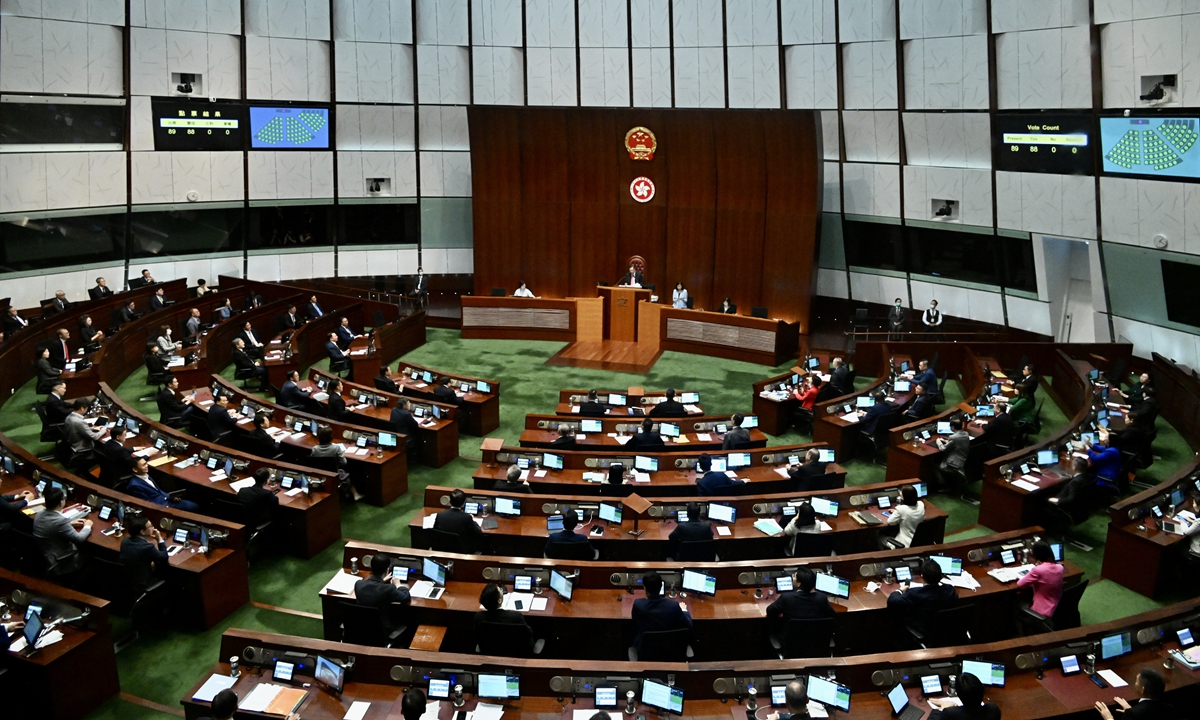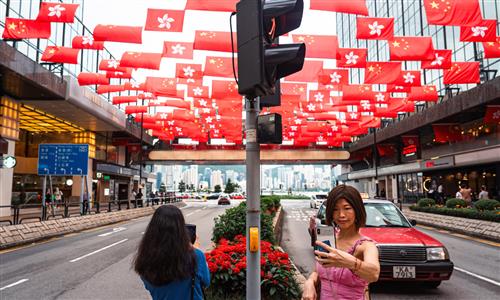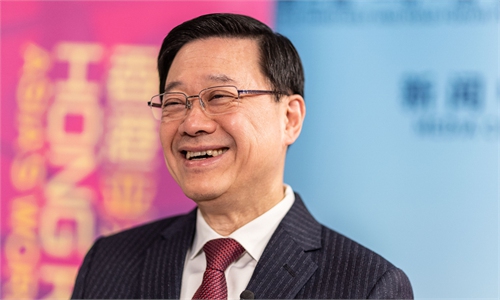
The Hong Kong Legislative Council has unanimously passed a bill on Thursday on amending District Council (DC) elections. Photo: VCG
A total of 399 candidates have registered for the 7th District Council Election in the Hong Kong Special Administrative Region (HKSAR), which will be highly competitive, with an average of four candidates vying for two seats in direct elections, HKSAR Chief Executive John Lee said on Tuesday.
These will be the first district council elections since the city adopted the District Council amendment in July, which, in accordance to the principle of "patriots administering Hong Kong," aims to put an end to the chaotic political performance of previous years when opposition forces hijacked district councils for political goals.
Since 2020, a large number of district council members have disregarded their functions by endangering national security, advocating "Hong Kong secessionism," opposing the National Security Law for Hong Kong and interfering with government administration.
In response to the absence of candidates that are not pro-establishment in the district council race, Lee emphasized on Tuesday that those interested in running must meet certain basic criteria, including being a patriot, supporting the Basic Law and being loyal to the HKSAR government while obtaining enough nominations.
The nomination period for the District Council election ended on Monday with only pro-establishment members securing enough nominations from the three committees, namely the Area Committee, the District Fight Crime Committee and the District Fire Safety Committee, to run.
On average, four candidates will compete for two seats in each district, with a total of 171 candidates vying for 88 directly-elected positions, Lee said, noting that the race extends to the three district committees, where 228 candidates will be vying for 176 seats, eliminating any chance of an uncontested election.
Under the nomination system, those who wish to run for election must strive hard to secure nominations, which reflects the new system's role in "selecting the best," Lee said. The three committees have the responsibility to judge whether the candidates are true patriots who love the country and the city, ensuring that council members are sincerely and competently serving.
The overall seat number of the new District Councils will be 470, including 179 appointed seats, 176 mutually elected seats among district committees and 88 directly elected seats, according to the reform plan unveiled in May.
Zheng Yanxiong, director of the central government's liaison office in Hong Kong, said at a forum on Tuesday that to judge a patriot, one must not only listen to their words but also observe their actions.
It is impossible for someone who has been involved in anti-China and activities that disrupt Hong Kong, or whose political group have been engaged in such activities, to suddenly change and become a patriot by simply shouting a few slogans, Zheng said.
While being willing and happy to accept those who went astray and have since shifted to a patriotic pro-Hong Kong stance, the Chinese official said confirming such a transformation takes time and must be evidenced through action.
The candidates include individuals who have been engaged in community service for many years, young people eager to serve their communities, and members of ethnic minorities, according to the chief executive.
However, there are definitely no individuals who intend to use the district council seats to jeopardize national security or create chaos in Hong Kong, nor are there any selfish individuals merely looking to stir up political strife for personal gain, he stressed. This demonstrates that the new system is effectively selecting the best candidates.
"The nomination serves as a demonstration to those not in the pro-establishment camp that if they still wish to participate in local governance in the future, they must find a way to prove that they have undergone a complete transformation to become patriots, gaining the trust of the central government," Lau Siu-kai, a consultant from the Chinese Association of Hong Kong and Macao Studies who is also a senior policy advisor, told the Global Times on Tuesday.
The "diversity" among the candidates belonging to the patriotic camp means that while everyone's patriotic stance is fundamentally consistent, there are different opinions on specific issues such as social economy and people's livelihood, Lau said.
Also, the election methods should not be designed or measured by Western democratic standards, he noted. Otherwise, it could easily transform the district councils into a battleground for party strife and challenges against the government.
Four years ago, the sixth District Council election in Hong Kong took place against the backdrop of a color revolution, when anti-China and disruptive forces utilized violent means to coerce, intimidate and attack patriotic pro-Hong Kong candidates and citizens, Zheng said.
A large number of disruptive individuals took advantage of the chaos to get elected, plotting a "three-step strategy" to seize power from the district councils to the Legislative Council and then the chief executive, advocating for "Hong Kong independence," fueling violent unrest, deliberately obstructing government administration, and severely endangering national security and the public interest, he said.
Root causes of the social turmoil in Hong Kong have not been completely eradicated, and the foundation of governance still needs to be protected from external forces in the West, such as the US' continuous interference and intervention, he noted.
"Only by further improving local governance and ensuring that the district councils are completely dominated by patriots can we prevent the district councils from being hijacked again and thoroughly eradicate the soil that nurtured the color revolution," Zheng added.




